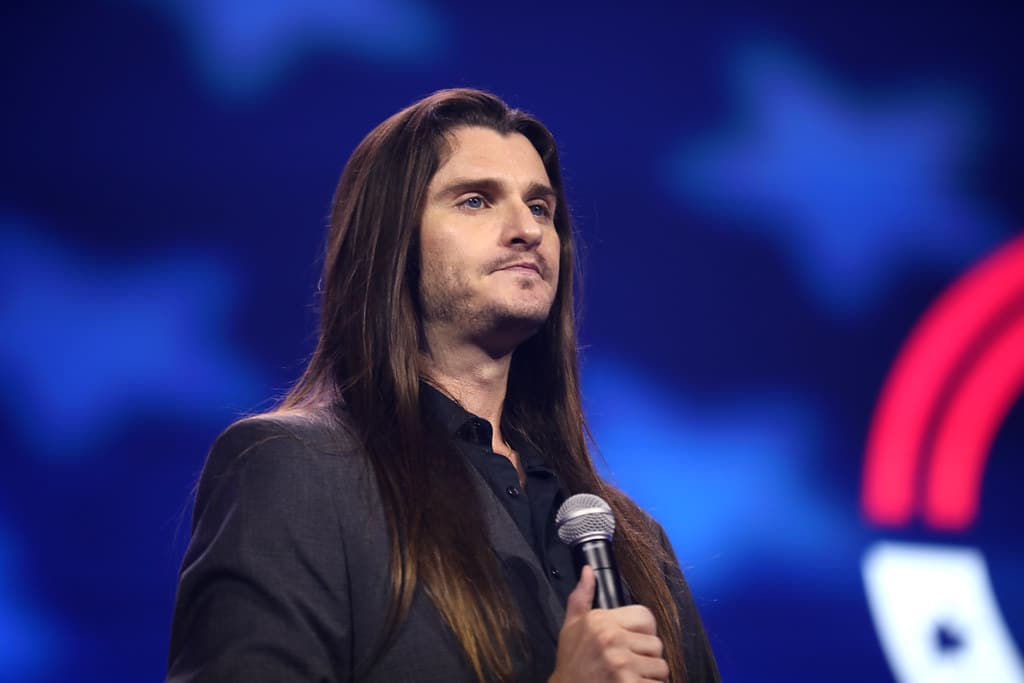This article aims to honor and detail the extraordinary efforts of Scott Presler, whose hard work and loyal dedication played a pivotal role in turning Pennsylvania red, a feat that many considered improbable.
The Unsung Hero of Pennsylvania: Scott Presler’s Tireless Efforts for Trump’s Re-election
[playht_player width=”100%” height=”90px” voice=”Salli”]
In the annals of American political history, there are moments when individual dedication can tip the scales of democracy. The 2024 election cycle in Pennsylvania provides a vivid example of this through the endeavors of Scott Presler, a grassroots activist whose commitment to Donald Trump’s re-election campaign in the Keystone State was nothing short of Herculean. This article aims to honor and detail the extraordinary efforts of Scott Presler, whose hard work and loyal dedication played a pivotal role in turning Pennsylvania red, a feat that many considered improbable.
The Background of the Battle
Pennsylvania, known for its “blue wall” status, was always going to be a battleground state, with its 19 electoral votes making it a key prize in the race for the White House. The state had swung back and forth between Republicans and Democrats in recent elections, with Trump narrowly losing it in 2020. Understanding the significance, Presler set his sights on Pennsylvania, determined to alter its political landscape.
The Vision of Scott Presler
Scott Presler, with his background as a conservative activist, recognized early that voter registration and mobilization would be the backbone of any successful campaign. His vision was clear: to ensure that every potential Trump voter was registered, educated about the importance of their vote, and motivated to participate in the election.
Early Days: Laying the Groundwork
Voter Registration Drives:
- Target Demographics: Presler knew that to win Pennsylvania, he couldn’t just rely on traditional Republican voter bases. He targeted demographics often overlooked or not fully engaged, like the Amish communities, hunters, and younger voters, particularly those in fraternities.
- Strategic Locations: He organized registration drives at gun shows, archery events, and notably at the Green Dragon flea market known for its Amish and Mennonite visitors. These were not random choices but calculated moves to meet voters where they naturally congregated.
Building a Team:
Presler didn’t work alone. He rallied volunteers and hired staff, understanding that a grassroots movement required many hands. His team became known for their relentless work ethic, often working far beyond traditional campaign hours, driven by a shared belief in the cause.
The Campaign Trail: A Man on a Mission
Personal Outreach:
- Door-to-Door Campaigning: Presler was often seen knocking on doors, engaging directly with Pennsylvanians. His approach was personal, respectful, and aimed at understanding the concerns of voters, which allowed him to address issues like job security for union workers, religious freedoms for the Amish, and gun rights for hunters.
- Community Engagement: He spoke at local events, participated in town hall meetings, and made himself a familiar face in communities across the state, from urban centers to rural areas.
Utilizing Social Media:
With his substantial following on X, Presler leveraged social media to amplify his message, share successes, and keep the momentum going. His updates were candid, often showing him in the thick of the work, which resonated with both followers and the undecided.
Legal and Logistical Battles:
Challenging Voter Registration Issues: Presler was vocal about issues like voter registration backlogs. He threatened legal action in counties like Luzerne when he believed the process was being hindered, although he didn’t follow through with lawsuits, his pressure contributed to improvements in the registration process.
The Turning Points
Flipping Counties:
Under Presler’s influence, several counties flipped from Democrat to Republican. Beaver, Luzerne, and Bucks counties are notable examples where his registration efforts helped shift the balance. This wasn’t just about numbers; it was about changing the perception that Pennsylvania was a lost cause for Republicans.
Amish Outreach:
Perhaps one of the most unique strategies was his engagement with the Amish community. By addressing issues pertinent to them, like the protection of their farming practices and religious freedoms, Presler managed to engage a demographic famously known for low voter turnout. His promises to protect their way of life resonated, leading to an unprecedented Amish voter turnout for Trump.
Youth and Frat Votes:
Recognizing the power of the youth vote, Presler made inroads into college campuses and fraternities. He appealed to their concerns about government overreach, economic policies, and peace over war, significantly impacting the vote in areas like State College.
The Election Day Triumph
Election Day Mobilization:
As election day approached, Presler’s efforts shifted to ensuring those registered would vote. This included setting up transportation for those in rural areas or the Amish, who might otherwise find it challenging to reach polling locations.
Early Voting Push: Despite traditional Republican skepticism towards mail-in voting, Presler encouraged its use where necessary, understanding the strategic advantage of early voting in a state with close margins.
The Results:
The results spoke for themselves. Trump won Pennsylvania with a margin that surpassed his 2016 victory. While multiple factors contributed to this outcome, the groundwork laid by Presler cannot be overstated. His efforts were directly credited for the increased Republican voter turnout in crucial areas.
The Aftermath: A Legacy of Dedication
Public Recognition:
After the election, Presler’s name was celebrated across conservative media. Figures like Lara Trump, Elon Musk, and numerous conservative influencers and politicians praised his dedication. His work was seen as instrumental, not just in the win but in the broader context of grassroots political activism.
Inspiring Future Activists:
Presler’s story has become a case study for political engagement. His methods have inspired others to take similar actions in their states, showing that individual effort, when channeled correctly, can lead to significant political change.
Continued Advocacy:
Even after the election, Presler hasn’t slowed down. His focus has shifted towards ensuring voter integrity, continuing to engage with communities, and preparing for future electoral battles. His organization, Early Vote Action, remains active, demonstrating his long-term commitment to political activism.
Conclusion: An Epitome of Grassroots Activism
Scott Presler’s journey in Pennsylvania during the 2024 election wasn’t just about political strategy; it was a testament to what dedicated, heartfelt activism can achieve. He didn’t just campaign; he connected with people on a human level, understanding their lives, fears, and aspirations. His work was a beacon of how politics can be about community, care, and personal responsibility rather than just policy and power.
In the end, Presler’s legacy in Pennsylvania will likely be remembered as a pivotal moment where one man’s dedication helped redefine the political landscape of an entire state. His story is a powerful reminder that in American democracy, every vote counts, and behind every vote, there’s someone like Scott Presler, working tirelessly to ensure that voice is heard. As Pennsylvania turned red, it wasn’t just a victory for Donald Trump; it was a victory for the spirit of grassroots activism, personified by Scott Presler’s unwavering commitment.










